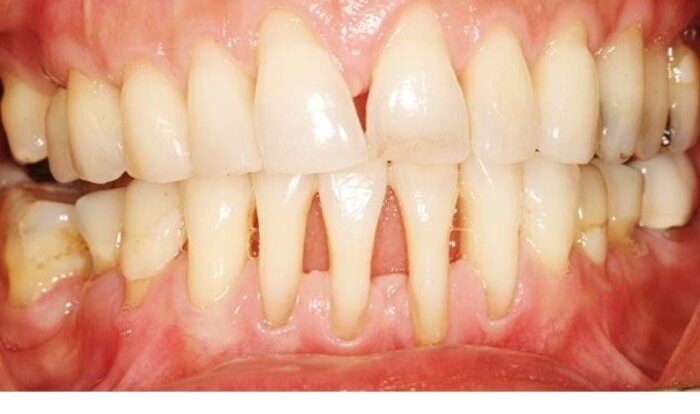
Suffering from gum disease but can’t make it to the dentist? Don’t worry, there are ways to address it at home! Let’s dive into how to cure gum disease without a dentist and restore your oral health.
This guide will provide you with practical tips, natural remedies, and lifestyle changes that can help you combat gum disease and achieve a healthier smile.
Identify Natural Remedies

Natural remedies have been used for centuries to treat various health conditions, including gum disease. These remedies offer potential benefits in reducing inflammation, killing bacteria, and promoting healing.
Gum disease is a common problem that can lead to serious health issues if left untreated. While it’s always best to see a dentist for professional treatment, there are some things you can do at home to help cure gum disease without a dentist.
Click here to learn more about how to cure gum disease without a dentist.
Some of the commonly used natural remedies for gum disease include:
Clove Oil, How to cure gum disease without a dentist
- Clove oil has antibacterial and anti-inflammatory properties that can help reduce gum inflammation and pain.
- It can be used by diluting a few drops in a carrier oil, such as coconut oil, and applying it to the affected area.
Tea Tree Oil
- Tea tree oil is known for its antiseptic and antimicrobial properties.
- It can be used by adding a few drops to a glass of water and using it as a mouthwash.
Turmeric
- Turmeric contains curcumin, a compound with anti-inflammatory and antioxidant properties.
- It can be used by mixing a teaspoon of turmeric powder with a little water to form a paste and applying it to the gums.
Practice Good Oral Hygiene
Gum disease is primarily caused by poor oral hygiene. Maintaining good oral hygiene is essential for preventing and treating gum disease. This involves brushing and flossing regularly to remove plaque and bacteria from the teeth and gums.
When brushing, use a soft-bristled toothbrush and gentle circular motions. Brush the outer, inner, and chewing surfaces of each tooth, as well as the gum line. Flossing is equally important as it removes plaque and bacteria from between the teeth, where brushing cannot reach.
Use a gentle sawing motion to floss between each tooth, curving the floss around the base of each tooth to remove plaque and bacteria.
Antiseptic Mouthwashes
Antiseptic mouthwashes can be a valuable addition to your oral hygiene routine. They contain ingredients that kill bacteria and reduce plaque buildup. Use antiseptic mouthwash twice daily after brushing and flossing. Swish the mouthwash around your mouth for 30 seconds, then spit it out.
Do not rinse your mouth with water after using antiseptic mouthwash, as this can reduce its effectiveness.
If you’re looking for a natural way to cure gum disease, there are a few things you can do. First, try rinsing your mouth with salt water several times a day. This will help to reduce inflammation and kill bacteria.
You can also try applying a paste made of baking soda and water to your gums. This will help to neutralize acids and remove plaque. If these home remedies don’t work, you may want to consider visiting a dentist for more professional treatment .
Modify Diet and Lifestyle
Gum disease is a common condition that can lead to serious health problems if left untreated. While there are many ways to treat gum disease, some natural remedies can help improve gum health and prevent the condition from worsening.
One of the best ways to improve gum health is to modify your diet. Certain foods and drinks can contribute to gum disease, while others can help promote gum health.
Gum disease is a common problem that can lead to serious health issues if left untreated. While it’s best to see a dentist for professional treatment, there are some things you can do at home to help cure gum disease.
You can find more information about how to cure gum disease without a dentist here . These methods can help reduce inflammation, kill bacteria, and promote healing.
Foods to Avoid
- Sugary foods and drinks: Sugar is a major food source for bacteria that cause gum disease. When you eat sugary foods or drinks, the bacteria produce acids that can damage your teeth and gums.
- Sticky foods: Sticky foods, such as candy and gum, can stick to your teeth and gums, providing a food source for bacteria.
- Acidic foods: Acidic foods, such as citrus fruits and tomatoes, can erode your tooth enamel, making your teeth more susceptible to decay and gum disease.
Foods to Eat
- Fruits and vegetables: Fruits and vegetables are high in vitamins, minerals, and antioxidants that can help protect your gums from damage.
- Dairy products: Dairy products, such as milk, cheese, and yogurt, are good sources of calcium, which is essential for strong teeth and bones.
- Lean protein: Lean protein, such as fish, chicken, and beans, can help repair and rebuild gum tissue.
Other Lifestyle Factors
In addition to diet, other lifestyle factors can also impact gum health. Smoking and stress can both contribute to gum disease.
Smoking damages the blood vessels in your gums, making them more susceptible to infection. Stress can also lead to gum disease by weakening your immune system.
If you smoke, quitting is one of the best things you can do for your gum health. Managing stress can also help improve your gum health.
Explore Alternative Therapies
Beyond traditional dental care, alternative therapies offer potential benefits for gum health. These practices aim to address inflammation, promote healing, and enhance overall well-being.
Curing gum disease doesn’t always need a dentist. With a little know-how, you can do it yourself. Check out this awesome guide on how to cure gum disease without a dentist . It’s got all the tips and tricks you need to get your gums healthy again.
Oil Pulling
Oil pulling, an ancient Ayurvedic practice, involves swishing a tablespoon of oil in the mouth for 15-20 minutes. Traditionally used with sesame oil, coconut oil, or sunflower oil, this technique is believed to draw out toxins and reduce inflammation. The antibacterial and anti-inflammatory properties of the oils may help combat gum disease and improve oral hygiene.
Other Alternative Therapies
Acupuncture and yoga have also shown promise in promoting gum health. Acupuncture, by stimulating specific points on the body, may help regulate the immune system and reduce inflammation. Yoga, through its emphasis on stress reduction and mindfulness, can indirectly benefit gum health by reducing cortisol levels and promoting overall well-being.
Create a Personalized Treatment Plan

To effectively address gum disease, it’s crucial to develop a personalized treatment plan that aligns with your specific needs and preferences. Consulting with a healthcare professional, such as a dentist or periodontist, is essential for tailored advice and guidance.
Various treatment options are available, ranging from over-the-counter medications to prescription drugs. Your healthcare provider can help determine the most suitable course of action based on the severity of your condition and individual circumstances.
Over-the-Counter Medications
Over-the-counter medications can provide temporary relief from gum disease symptoms, such as pain, inflammation, and bleeding. These include:
- Antiseptic mouthwashes (e.g., chlorhexidine, cetylpyridinium chloride)
- Pain relievers (e.g., ibuprofen, naproxen)
- Antibacterial gels (e.g., triclosan)
Prescription Drugs
In more severe cases, prescription drugs may be necessary to combat gum disease. These include:
- Antibiotics (e.g., amoxicillin, metronidazole)
- Anti-inflammatories (e.g., prednisone)
- Antiseptics (e.g., minocycline, doxycycline)
| Treatment | Recommended Use |
|---|---|
| Over-the-counter medications | Temporary relief of symptoms |
| Prescription drugs | Severe cases, combatting infection |
It’s important to follow the prescribed dosage and instructions carefully and to inform your healthcare provider about any side effects or concerns.
Last Point

Remember, gum disease is a common but manageable condition. By following these tips and making some lifestyle adjustments, you can effectively cure gum disease without a dentist and maintain optimal oral health.
If you have any concerns or experience persistent symptoms, don’t hesitate to consult a healthcare professional for further evaluation and guidance.
Clarifying Questions: How To Cure Gum Disease Without A Dentist
Can I use salt water to cure gum disease?
Salt water can help reduce inflammation and kill bacteria, making it a beneficial home remedy for gum disease. Mix half a teaspoon of salt in a glass of warm water and rinse your mouth for 30 seconds.
Is flossing really that important for gum disease?
Absolutely! Flossing removes plaque and bacteria from between your teeth, where your toothbrush can’t reach. Regular flossing helps prevent plaque buildup, which is a major cause of gum disease.
What foods should I avoid if I have gum disease?
Sugary foods, processed snacks, and sticky candies can feed the bacteria that cause gum disease. Instead, opt for fruits, vegetables, and whole grains that promote oral health.





